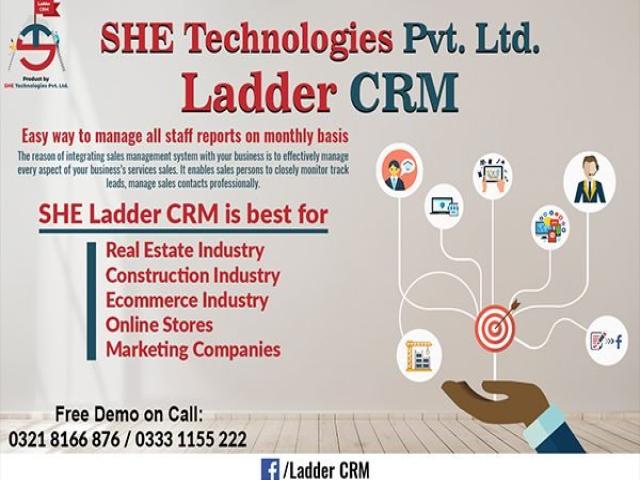Fastest CRM Software in Pakistan (Customer Relationship Management System)

Definition of CRM software
Customer relationship management (CRM) is a process in which an organization uses data analysis to manage its relationships with its customers.
The answer to this question is that we are automating what?
The following are a few tasks that a CRM software in Pakistan can streamline for a business:
- Management of customer relations, including telecommunications
· Segmentation of the customer base;
· Automating the sales process;
· Managing the price of goods and services;
· Marketing company management;
· Controlling the work of employees;
· Management of information;
- Automation of the workflow.
Many business processes can be slowed down by a lack of a tool for automating them, which can lead to an increase in management costs, a decrease in service to customers, and, as a result, lower sales.
Wherever there are customers, they can use a CRM system. The type of business will, of course, impact the usage profile. Customer relationship management (CRM) systems can be used by a beauty salon, car service, or even an online retailer. I propose delving deeper into this topic and examining the tasks that they can accomplish within the framework of these companies (a beauty salon and a car service are almost identical in terms of the functionality used).
Online-store:
- Management of customer interactions;
The previous purchases of the customer;
Providing relevant products;
Delivery services integration;
The control of deliveries;
Managers' performance (sales, number of clients, etc.) is monitored;
They can integrate analytics systems with web analytics.
Management of the loyalty program;
- Voice over IP.
Consider the following questions to help you make an informed decision about the best option for your company:
Is it challenging to choose a CRM system?
We are selecting a feature set.
The way a system is used in one company may be completely different in another, as we saw in the previous paragraph. This means that before making a decision, you should examine the business processes present in your company at all times. It is a feature of the CRM market that solutions tailored to specific businesses are available. There are ready-made systems for beauty salons, fitness centers, car wash (services/salon), dental, veterinary, and online stores, to name just some.
The option to select a solution based on its type. We're discussing either a cloud-based or on-premise solution (installed on your computing power).
One is supported by the quick deployment, low entry threshold in IT technology competencies, and the absence of software product updates. If you have a weak Internet connection, you may lose the ability to serve customers when the harmony is disrupted. In the eyes of the law, cloud storage of private information about you and your customers poses additional risks. Personal data and security laws have not been repealed. The advantages of on-premise are the ability to refine the program code (within the limits that the solution provider allows) to expand functionality, and the ability to work without the Internet (provided, of course, that the server with the CRM system is running somewhere in the next room), and a more secure system. On-premise can refine the program code (within the limits that the solution provider allows).
A variety of options for connecting to external systems are available for integration. Interaction between modules and third-party systems is commonplace in modern CRM systems. I'll go over the most critical integrations in this section.
Integration of telephony.
The main reason it's a must-have is that it can do your job and your employees' jobs a lot simpler. Your employees may be able to sabotage the process of entering information into the system after a phone call to a client (provided that the telephony and CRM systems are separated). This is going to cost a lot of money to fix. Making it so that a user cannot mark contact with a client in the system or write a comment is more straightforward and reliable.
We are integrating with email and SMS mailing systems.
A partial list of tasks that can be quickly and easily automated includes:
- Notifying customers of marketing promotions
- Congratulating them on their birthdays
- Sending promotional codes for a discount as part of a loyalty program
- Responding to customer requests
If they want to keep their employees informed about upcoming shifts, send them information about salaries, or plan a corporate event at the local bar, they can use these mailings to do so.
Connectivity to popular content management systems (CMS) and their websites and engines. Instantly enter leads from the feedback form into your database, upload goods, and product balances, and update prices on the location of your online store using this software.
Connecting to social media
When a message is received from a social network, the page's audience is monitored, communications are processed, and registered leads are.
I am using an API to integrate (Application Programming Interface).
A CRM system that allows third-party solutions integrated via an API immediately demonstrates its flexibility. Unfortunately, not all CRM software is equipped with this feature. APIs will enable you to connect to other software and transfer data between them (for example, your website or a self-written software). CRM's import function will save you time if you're new to the software or moving from another software.

Russia toughens its posture amid Ukraine tensions
- With tens of thousands of Russian troops positioned near Ukraine, the Kremlin has kept the U.S. and its allies guessing about

Secrets And Benefits of Online Academy Services
- A few states have moved to electronic certificate check to prevent control or change of paper capabilities

Best Hybrid Cars With Most Secure And Safe Driver in Arab Emirates
- whats more, a private helipad. Examining excess, the housing features an engaging wellspring

Check out McCormick Parts Manuals now
- Today we want to present you an impressive collection of McCormick Parts Manuals for tractors and other agricultural machinery. If you are a farmer